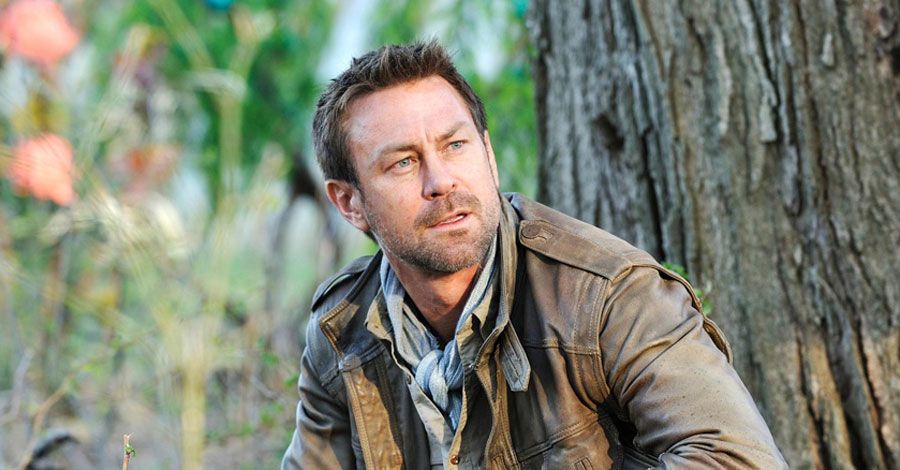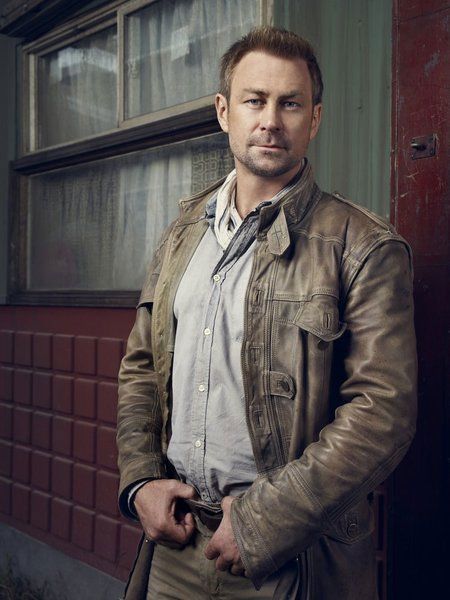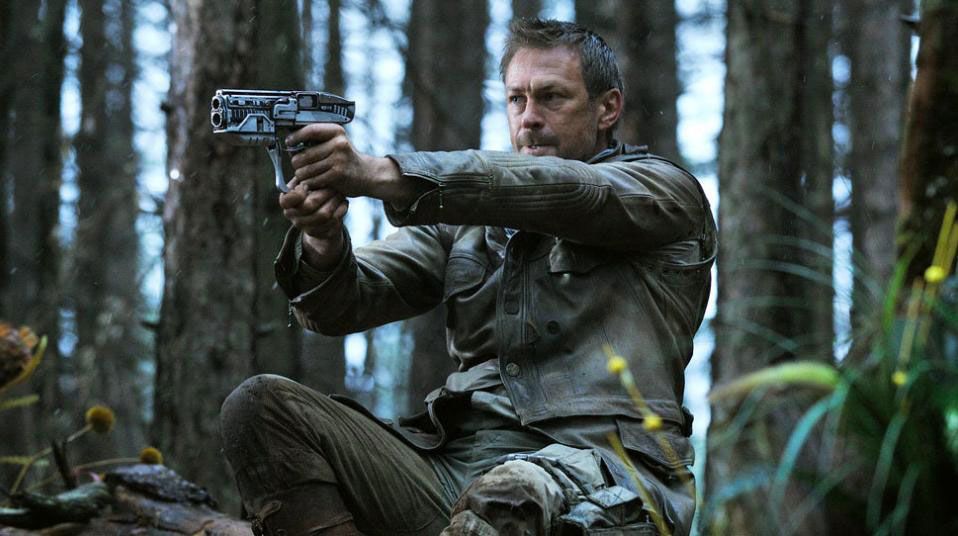As lawkeeper Joshua Nolan, "Defiance's" Grant Bowler embraced being a military man and a protector of the people, but his primary concern has always been his adopted daughter Irisa. However, when she became possessed by a sentient alien force in the second season of the Syfy drama, he had no choice but to do everything in his power to stop her from destroying the planet -- which left them both hibernating in a life pod buried beneath the city.
When Season 3 opened last week, months have passed since the catastrophe, and Defiance had moved on, but Nolan may not like what he sees.
The good-humored Bowler spoke with Spinoff on “Defiance’s” Toronto set about Nolan's change in attitude, his relationship with Irisa and the harsh filming conditions.
Spinoff: There have been a lot of sci-fi/Western hybrids. How important is it to find the right balance between the two genres?
Grant Bowler: There were deliberate moves by [executive producer] Kevin Murphy to write it more seamlessly. It can be problematic, that natural marriage between Western and science fiction. You look at "Cowboys & Aliens" as a great example. It became one-half of a cowboy movie and one-half of an alien movie. Literally, it got split down the center. Although there is room for that in cinema -- I think "From Dusk Till Dawn" is half a heist movie, half a vampire movie. It's definitely always going to be an experiment and it's not always going to work in the long form. For us, given that it was a thematically big part of the show from the beginning, consciously, it was a matter of making it seamless so that you don't quite see where the Western begins and ends, where the post-apocalyptic begins and ends or where the science fiction begins and ends. We are really a morphing of three genres, if you like.
I think it's all driven out of audience desire -- or what we as storytellers perceive as audience desire -- and that is for more complicated narratives. They are looking for narratives that have both greater complexities within themselves, and also, hopefully, a meta-narrative that sits above and apart from that. Audiences are becoming very demanding. They want more, more and more, which I love.
You character was Defiance's lawkeeper. What does that position mean to him and how does it define him?
That is a question that I have held onto very tightly ever since the pilot. "Hold on. How does he get the badge? Why do they want to make him lawkeeper?" In Season 2, I grilled Kevin Murphy and Michael Nankin over and over again. "Why does he take that badge back?" In Season 3, whether he wears the badge or not, he's the same guy in town. That's another interesting thing. He could wear the lawkeeper badge or not wear the lawkeeper badge, but he's going to do the same things. He's going to perform the same role. It would be easier not to wear it because he could get away with a bit more. Maybe people would feel a little bit more comfortable if he was wearing it because he would get away with a little bit less.
What can you tell us about Nolan in Season 3 and what his relationship with his daughter is like
I hated that they were so disconnected in Season 2. Part of it was personal, because I like working with Stephanie [Leonidas] and because that relationship is the cornerstone of playing that season. I have a daughter who is turning 12 next week, so playing that father/daughter relationship is key to me. It's very close to my heart. Season 2 was difficult for us to play because it was all about conflict and separation.
This season has been wonderful. We both felt like we had existed in an atmosphere of withdrawal in Season 2. It was actually painful. It wasn't pleasant. Season 3 is fantastic. Everybody has been saying this actually, but in so many ways, Season 3 of "Defiance" is the Season 1 we would have dreamed of. It's the season where everything has become clear. The relationship is fantastic and has changed again. It is two-sided. My only problem with the relationship in Season 1 and 2 was it was a very Nolan-heavy relationship. In Season 1, he was fathering and parenting her and she was the child. In Season 2, she was just a pissed adolescent the whole time. Season 3 is a very well-balanced and mature relationship. I love playing it.
What can viewers expect in terms of what the town is like in Season 3?
In the end of every season, it seems I'm clinically dead. This time I took Irisa with me and we were frozen in the life pod at the end of Season 2. Season 3 opens seven months later. The EMC [Earth Military Coalition] has pulled out of Defiance. It is a power vacuum and Defiance has moved on. It's a very different and interesting place. I like the Defiance of Season 3 because in Season 1, it was a thriving boom town on the cusp of all this potential. Season 3 Defiance is a really interesting place. Everyone else has moved on, but Nolan and Irisa have been frozen, essentially. There's this fantastic dichotomy of perspective, where the majority of the people have healed and moved on, but, for us, it was five minutes ago. Amanda having my daughter in the sight of her rifle was 20 minutes ago. She's over it, but [Nolan's] not. There's this wonderful opportunity to look at those different perceptions that are happening.
"Defiance" Star Julie Benz Talks Keeping the Peace in Season 3
One of the biggest things about this season, and it's funny how much it played into the shooting of the show, was we started shooting in the dead of winter. It was horrible. On a day-to-day physical level, it's been horrible. It was the coldest February ever here. It was minus-25 degrees regularly with the wind chill. It was terrible. We were out in these God-forsaken spots. I remember one day there was this big crane shot of Stephanie and I and the snow was actually coming up hill. The wind was that hard. You really wanted to give up all hope when it's snowing up at you.
But the wonderful thing for me is I felt in Season 2, we got a little bit relaxed about the Badlands. I thought this idea of an oasis within a deadly environment had bled a bit. Season 3, because of the conditions we had to shoot in, from the first shot in the first episode, you understand that if you leave this town, you are going to die. When you walk out through the stasis nets, there is nothing and it's bleak and you will be dead within a day. It's fantastic. Whenever you see these characters out in the open, you can't help but go, "Get under cover. Get out of there now." You really fear for people's safety. That's been an amazing element of Season 3. It's given us this very strong post-apocalyptic landscape that we have played on in the past and had to rely partially on some mapping and CGI to help us along with the changes in the world. The snow that falls from the sky has done more than we could have done.
How did you raise the bar for the action? Will Nolan get to do more gun-slinging?
The show has gotten a little simpler. It's gotten back to a very strong "us versus them," back to a very strong external threat and back to everybody having to choose sides, but in a very immediate, visceral way. None of our problems are domestic anymore. They all have far-ranging, immediate and life-threatening consequences.
For Nolan, that inevitably means a lot of gunfire and a lot of fighting. In one week, I had five fights. I got to four and there was three feet of snow and my jacket weighs 30 pounds. Can you imagine having five fist fights in the snow, 50 times each and falling down in three feet of snow and getting up? By the end of the week I was exhausted.
What else can you tell us about this new alien race, the Omec?
The Omec are far more powerful than any other Votan race. They predate all the other Votan races. They were also once the masters of every Votan race. When they get to Earth, they are extremely unpopular with everybody -- except the humans who don't have any bloody idea who they are.
Do you believe the series could survive without Nolan? Are you ever worried that he will be killed off at the end of a season?
I've been killed off more times than you've had hot dinners. Everybody kills me. I'm that guy that they bring in to cause trouble. I don't see my character as the central character; I see a couple of the relationships as the central relationships. I think audiences get more attached to the relationships than the characters. You lose one or two of those pivotal relationships and you lose the show. It doesn't matter who is left. Oftentimes, I think there are dynamics that form the core. Science fiction can be very clever, but at the end of the day, if the audience doesn't care, it doesn't matter how clever you are. What was beautiful about Rutger Hauer in "Blade Runner" was he was like a child. You felt for him. He was monstrous, but he was a monstrous child and you invest in him some way. That's good science fiction when you feel for the bad guy, the psychopath. If you don't care, it doesn't matter.
If it came down to it, how would you like "Defiance" to end?
I would like it to end unexpectedly but not fade to black. I would hate if we did that. I'd like us to go before we jump the shark, do a live episode, a Shakespearian or a musical episode. I would like to see us go out when we're getting stronger and stronger, and better and better. I think there comes a point where creatively, everybody is on-point and you know you've had the best of it. It's always sad to limp out of something.
”Defiance” airs Fridays at 8 p.m. ET/PT on Syfy.



